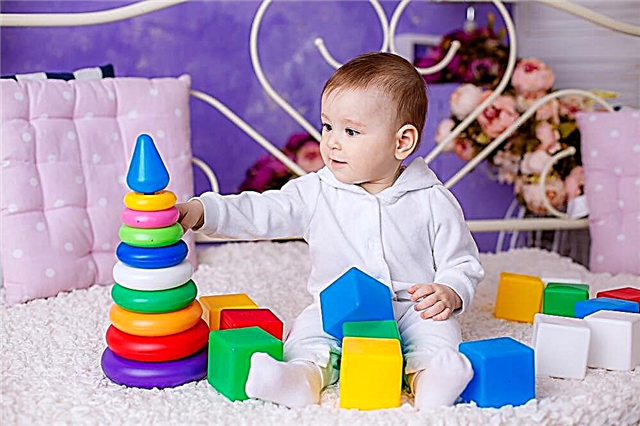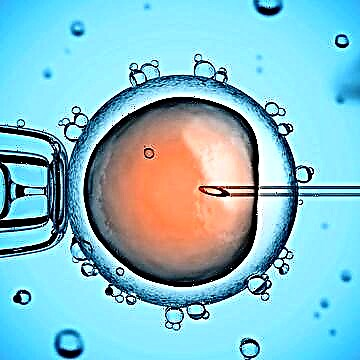
An eleven-month-old child pleases parents with independent steps and simple words. Children of this age are actively developing both physically and emotionally, consolidating previously acquired skills and mastering new skills. Let's find out how parents can determine whether a baby is developing normally at 11 months and how to stimulate the further development of a baby of this age.
Physiological changes
- By the age of 11 months, the child's muscular system has become so strong that it allows the child to hold and move the body in an upright position, that is, stand without support and walk.
- Most 11-month-olds already have four teeth. However, the next teeth (second incisors) began to appear in someone, and even the first tooth has not yet appeared in someone. These are variants of the norm and you should not worry until the age of one.

Physical development
During the eleventh month of life, the child's weight gain is on average 400 grams, and his height is about 1.5 centimeters. The increase in the circumferences of the chest and head occurs by about 0.5 centimeters.
The growth rates of different children, of course, differ, but to determine whether the baby is developing normally, there are normal limits and average values of indicators of physical development. The main of these indicators can be found in the following table:
You can use the calculator to calculate the norms for your child. The calculator is based on the standards for height and weight from the World Health Organization (WHO).
For the musical development of the child, conduct classes according to the "Tsvetonik" methodology Lazareva M.
What can the kid do?
- An eleven month old baby is active and moves a lot. A new skill of the toddler is the skill of standing without the help of an adult or holding onto a support. In addition, the toddler is already walking well, holding not two mother's hands, but only one. To get your favorite toy off the floor, the child will no longer fall, but will bend over or sit down. Some children have already started walking without support.
- With toys, an 11-month-old baby manipulates skillfully and very dexterously. Grasping an object, the baby opens his hand, taking into account the size of this object. The toddler already manages to put cubes in a small tower, assemble a pyramid, open boxes, take small objects from the floor or table with two fingers.
- The child loves music, so he likes various musical toys. Hearing a rhythmic melody, the baby will begin to dance to the beat.
- The baby is interested in books and looks at the illustrations for a long time.
- At the mother's request, the child is able to show body parts and perform many actions and movements that he learned and saw earlier. For example, a toddler shakes a doll, waves his hand goodbye, makes goodies, takes off his socks, unzips a jacket, finds a toy hidden under a blanket or in a box.
- The baby's speech becomes more and more emotional and varied. Words consisting of 1-2 syllables appear in it.
- The child understands well what his mother is telling him. He is overjoyed when praised, and also immediately reacts to a strict tone.
- The baby at 11 months becomes more and more independent. The baby gradually learns to dress and wash his face, brush his teeth, eat with a spoon. If the baby needs something, he no longer just cries, but points at the object with his finger, shakes his head (in the affirmative or negative), and also utters simple words.

To check if your 11 month old baby is developing normally, you need to:
- Assess whether the child sits well, crawls on all fours and stands at the support.
- Show the child a closing box in which to hide a toy in front of the baby. The child should notice that the object has disappeared and try to find it.
- Check if the child can imitate the movements of adults, which he was previously shown. For example, the baby should try to eat with a spoon, comb, wash his face.
- Offer the baby to build a tower of cubes. The kid should already be able to put 2-3 cubes on top of each other.

Development activities
- Encourage the baby to both crawl and walk. Put a ribbon on the floor and invite the baby to step over it (while holding the child by one hand). Let the baby also walk behind the stroller, after the ball, move with the toy-wheelchair.
- Don't miss the opportunity to walk up the stairs with your baby. It is quite easy for many kids to climb the stairs, but they may not be able to descend yet.
- Pay a lot of attention to the development of the toddler's motor skills and activities for little fingers. Let the crumb pour the cereal from one cup to another, picking it up with a spoon. Have your child draw on a tray of flour, offer to put rings on your fingers and yours, and to assemble a pyramid.
- While swimming, give the little one a ladle or a sieve and offer to fish small floating toys in the water.
- Give the child a toy wrapped in paper napkin or foil and then offer to unfold it. Also give your baby the ability to open boxes and jars with screw lids.
- Play story games with your child, for example, you can feed the bear together, put on a vest or a hat on the doll. In such games, you can show the baby different situations, for example, the bunny asked the bear for a cube and the bear shared the toy, the doll fell and cries, it hurts.
- Draw and sculpt with a crumb. To do this, give your child thin pencils, crayons or felt-tip pens, as well as salted dough and safe soft plasticine.
- Support your baby's speech development with constant communication with your baby. Name the toys that you give or show to the baby, show Doman's cards, comment on your own actions.
- Set aside some time each day to read together. Ideally, the baby should have its own shelf for books, which the baby can reach to select a book. Read aloud to your child often and tell stories from pictures.
- If you went shopping with an 11-month-old baby, show the baby different products, and also let the baby put several items in the basket or cart on its own.
- Don't miss out on opportunities to socialize with other kids. Go for walks on the playground, invite families with children to visit, make new acquaintances.

Care
- Every morning of an 11-month-old baby begins with washing, brushing teeth, and combing.
- Regularly plant the baby on the pot after sleep, accustoming him to such a habit, but do not insist if the baby ignores the pot or is even afraid of it.
- Be sure to wash your baby after using the toilet.
- Cut off the hair and nails of the baby as needed, clean the ears.
- Bathing a child at this age is no longer possible every day, but daily bathing can serve as an important element of an evening ritual, then you should not give it up.
- For hardening, use airing the room before bedtime, air baths, daily walks, rubdowns, bathing, dousing and other procedures that the baby met earlier.
- Do not give up massage and gymnastic exercises. At 11 months old, babies still need them every day.
Daily regime
At 11 months, babies need 14-15 hours of sleep per day. For about 10 hours, a child of this age sleeps at night, and during the day two naps last about 1-2 hours. Twice a day, they go for a walk with an 11-month-old baby, organizing it so that the child sleeps on the street part of the walk (at least one daytime nap), and the rest is spent actively. It is recommended to go out for a walk with the baby at 10-11 o'clock in the morning and at 16-17 o'clock in the afternoon.

In organizing the wakefulness of a child of this age, the time of day is taken into account. In the morning they carry out gymnastics, active games, developmental activities, and in the afternoon, the crumbs' pastime should be more calm. It is recommended to observe the nightly laying ritual, which will make it easier for the little one to fall asleep. Such a ritual may include bathing, reading, and other activities repeated daily in the same order.
An 11-month-old baby is still fed five meals a day. Between meals, usually 3 to 4 hours pass, and you should try to feed the baby at about the same time every day (deviations up to 30 minutes are permissible) and do not allow breaks for more than 4.5 hours.
To determine the total amount of food that needs to be given to a child of this age per day, the body weight of the crumbs is divided by 9. On average, babies of 11 months eat from 1000 to 1200 ml of food per day. This volume is distributed over the number of feedings, resulting in an average dose of 200-240 ml.
The menu for bottle-fed babies and babies who continue to breastfeed at 11 months practically coincides, with the only difference that in the first and last feeding the baby is given either a mixture or breast milk. In addition, a baby receiving breast milk often at this age is applied to her mother's breast at night, and artificial babies usually sleep all night without feeding.
Breastfeeding at this age changes slightly due to the increase in the amount of food consumed by the crumb. The toddler is applied during the day to the mother's breast for several minutes, and can also drink any food with breast milk. At night, the child actively sucks in his sleep in the morning.
Read more about the menu for a child at 11 months in another article.

Typical day
As the child grows up in the first year of life, spending days with the baby becomes more interesting. Thanks to the organization of the daily routine, the baby's nervous system develops normally, and the mother manages to do more, regularly deal with the baby, and also provide the baby with sound sleep and good appetite. Of course, the regime will be different for each individual toddler, but as an example, we offer one of the options for the daily routine with a child of 11 months of age:
To learn how to teach a baby to walk and whether it is worth using a walker, see the TV show "Life is great!"
Frequent problems
- Injury and fright after falling. The crumbs who take the first steps often fall, which is dangerous not only with the appearance of injuries, but also with the termination of attempts to walk because of fear. Be close to the child and never leave the baby alone in the room, and calm and distract the fallen toddler. If the child is injured during a fall, be sure to monitor the baby's condition and, in case of serious manifestations, show the baby to the doctor.
- Refusal of food in pieces. Many kids are so used to grated and chopped food that they literally choke on any inhomogeneous food. For a while, skip the food in chunks and chop all the food for the child, and then gradually start offering the crumbs solid food, for example, drying, peeled carrots, boiled potatoes, a slice of apple, baby cookies. Don't worry if your toddler continues to give up the bites as he is just learning to chew. Perhaps the failure of the crumbs is associated with teething or other health problems, so if your baby's eating only chopped foods worries you, you should consult a doctor.
- Refusal of any products. At 11 months, the child has already formed his own preferences in food, so you should not insist if the baby does not like some product. The best solution would be to exclude such a product from the menu for a while, and then offer it to the child again.

Tips for parents
- Many children who crawl quickly are in no hurry to take the first independent steps, because it is easier for them to move on four limbs. You do not need to worry and insist that the baby starts walking faster. In addition, studies have shown that babies who crawl for a long time start talking earlier, and their posture is better.
- For confident first steps of the child, you should take care of comfortable and high-quality shoes. She should have had a solid heel counter and a durable, non-slip, bendable outsole. In summer, invite your baby to walk barefoot on grass, sand and other uneven surfaces.
- Patiently teach your baby to be independent. Let the baby learn to dress, eat with a spoon, collect toys, wash, help mom in the kitchen.
- At 11 months it's time to think about organizing the baby's first birthday. You still have enough time to make the holiday interesting and not too tiring for the little one.
Diversify your day with classes according to the methodology "Little Leonardo" Teplyakova ON - an expert in intellectual development.



